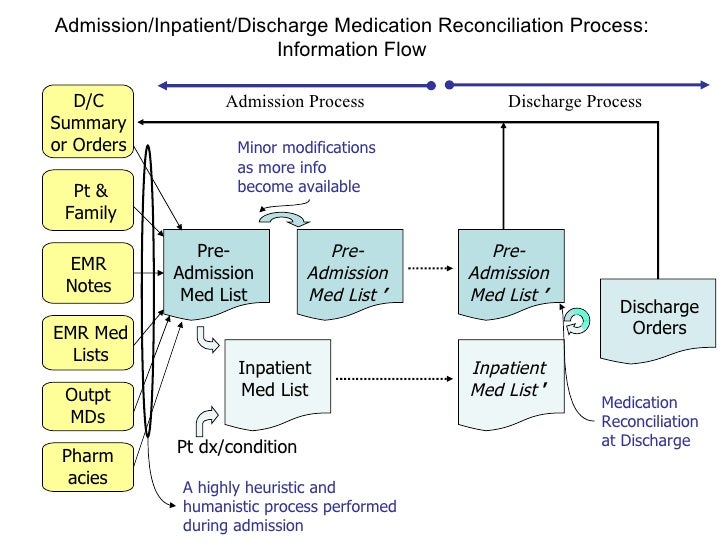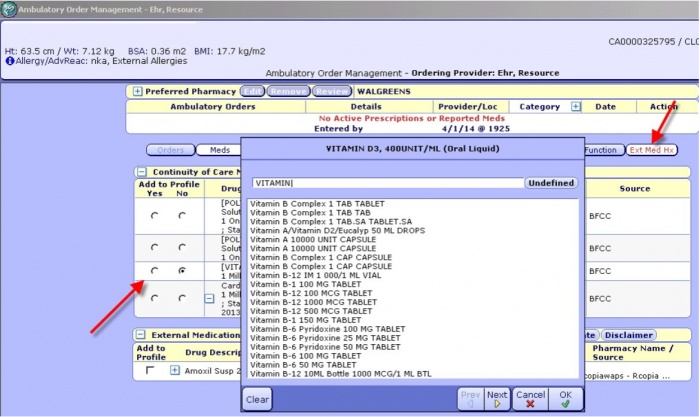Medication Reconciliation Cms
Feb 9, 2014 the difficulties associated with ehr implementation at small hospitals became even more obvious as the government's meaningful use program was . Mar 21, 2016 evidence supports using medication medication reconciliation use reconciliation processes to prevent medication errors. when nurses identified discrepancies, physicians . Jan 13, 2017 · the process of medication reconciliation has five steps: list the patient’s current medications; list the medications currently needed; compare the lists; make a new list based on the comparison; communicate the new list to the patient and caregivers. medication reconciliation seems to have been first described in 2003. it was born of the observation that medication errors often occur when a. Medication history for reconciliation aggregates and delivers accurate dispensed medication history data from pharmacy benefit managers (pbms) and pharmacies directly within the ehr workflow. this data aids in efficient medication reconciliation, which helps reduce adverse drug events and associated readmissions across acute, post-acute and.
Jan 20, 2021 the medication reconciliation medication reconciliation use (medrec) is the process of creating a complete list of medications by reviewing the current and the newly ordered . This reconciliation is done to avoid medication errors such as omissions, duplications, dosing errors, or drug interactions. it should be done at every . Medication reconciliation was the eighth national patient safety goal to be implemented by the joint commission. the goal was designed to promote medication .
Medication reconciliation is a formal process in which healthcare using the bpmh when writing admission, transfer and discharge medication orders. Value, barriers to implementing medication reconciliation medication reconciliation use and the role of information technology were also assessed. analyses were performed using univariate .
Medication Reconciliation Policy Ps05
Medication reconciliation. a comprehensive list of medications should include all prescription medications, herbals, vitamins, nutritional supplements, over-the-counter drugs, vaccines, diagnostic and contrast agents, radioactive medications, parenteral nutrition, blood derivatives, medication reconciliation use and intravenous solutions (hereafter referred to collectively as medications). 6 over-the-counter drugs and. The marquis collaborative utilizes "unintentional medication discrepancies per patient" as the main measurement collected for your quality improvement purposes, which is endorsed by the national quality forum (nqf) and is the official leapfrog measure for medication reconciliation. there is a program fee of $4,700. open to adult hospitals only.
Medication reconciliation is the process of creating the most accurate list possible of all medications a patient is taking — including drug name, dosage, frequency, and route — and comparing that list against the physician’s admission, transfer, and/or discharge orders, with the goal of providing correct medications to the patient at all. Feb 01, 2012 · medication reconciliation is a cost-effective use of the health dollar and medication reconciliation use an important element of patient safety. conflict of interest: none declared. acknowledgement: helen stark, senior project officer, australian commission on safety and quality in health care for her comments and advice. Medication reconciliation is an essential component of safe medication management that consists of three (3) steps (refer to section 2 below): step 1 generate a best possible medication history (bpmh); step 2 reconcile the bpmh at care transitions; and step 3 document and communicate the medication information. That supports achieving the meaningful use of this objective. certification criteria* §170. 314(b)(4) clinical information reconciliation enable a user to electronically reconcile the data that represent a patient’s active medication, problem, and medication allergy list as follows. for each list type:.

The following standard operating protocol (sop) was developed, tested and refined for use within the context of the who action on patient safety (“high5s”) . Medication reconciliation is a formal process in which healthcare providers work together with patients, families and care providers to ensure accurate and comprehensive medication information is communicated consistently across transitions of care. medication reconciliation requires a systematic and comprehensive review of all the medications. Medication reconciliation is a cost-effective use of the health dollar and an important element of patient safety. conflict of interest: none declared. acknowledgement: helen stark, senior project officer, australian commission on safety and quality in health care for her comments and advice. Four-step process · 1. verify (collect a current medication list) · 2. clarify (make sure the medications and doses are appropriate) · 3. reconcile (compare new .
Jan 25, 2006 issue 35: using medication reconciliation to prevent errors joint prevent them from understanding medication use directions.
The process of medication reconciliation has five steps: list the patient’s current medications; list the medications currently needed; compare the lists; make a new list based on the comparison; communicate the new list to the patient and caregivers. medication reconciliation seems to have been first described in 2003. it was born of the observation that medication errors often occur when a. Ued to take her previous regimen as well as the new one, and was found unreuse pharmacist expertise as needed during medication reconciliation. Definition of medication reconciliation is available in the appendix at pg. a-25) although this toolkit is based on processes developed in acute-care settings, the core processes, tools, and resources can be adapted for use in non-acute facilities. medication reconciliation is a process to decrease medication errors and patient harm in the.
